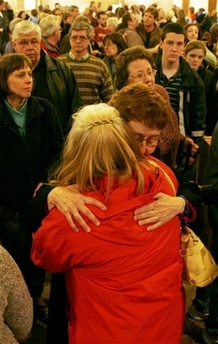Columbine families share Va. Tech sorrow
(AP)Updated: 2007-04-17 17:19
DENVER - When the topic turns to school violence, Tom Mauser usually lectures about guns.
|
|
Mauser became a national advocate of gun control after his 15-year-old son, Daniel, was among those slain in the April 20, 1999, shootings at Columbine High School.
But resignation punctuated Mauser's remarks Monday when he learned of the killings at Virginia Tech.
"I am not going to just say gun laws are going to take care of this," he said.
"I think my primary thought is about anger. Anger and suicide. Why do we have so many people who think they have to take others' (lives) with them when they take their own?"
Other Columbine victims and experts on school violence expressed similar thoughts about the Virginia killings.
Brooks Brown, a former Columbine student who knew the gunmen and repeatedly tried to warn authorities about threats they had made, said the Virginia slayings didn't surprise him.
"Once you've reached the point where you have lost everything it is not hard to be pushed in any direction," he said of campus shooters.
Brian Rohrbough, whose son, Danny, 15, died at Columbine, blames school shootings on a society that tolerates, even glorifies, violence.
"We teach students that anything you want to do is up to you and you can decide whether anything is right or wrong," he said.
Rohrbough said the investigation of the Columbine tragedy was incomplete and left unanswered questions about the psychology of school shooters.
Authorities did learn that Columbine killers Eric Harris and Dylan Klebold played violent games, made violent videos at school, and were the victims of bullying because they befriended the Trench Coach Mafia, a group of students who clashed with school athletes.
Rohrbough and others have fought for public disclosure of depositions given by the teens' parents, Wayne and Kathy Harris and Tom and Susan Klebold.
They argue the depositions could provide valuable insights into the home lives of the two teens, who killed 12 fellow students and a teacher before killing themselves.
But a federal judge two weeks ago ordered the depositions sealed for 20 years.
"That is why we were fighting so hard to get that information - because we need to know what was going on inside the heads of Eric Harris and Dylan Klebold," said Delbert Elliott, director of the Center for the Study and Prevention of Violence at the University of Colorado.
Killing others before committing suicide is not a new phenomenon, though the Virginia Tech numbers are shocking, said Tom McIntyre, coordinator of the Graduate Program in Behavior Disorders at Hunter College in New York.
"Freud said homicide is just suicide turned inside out," said McIntyre, who began studying school violence after Columbine. "The main motive is revenge."
In the past, a pre-suicide killing usually involved a specific target - as in the case of a husband finding his wife with a lover, Elliot said.
The victims in the Columbine and Virginia Tech shootings appeared to be random targets, he said.
"I don't know how many times we have to go through things like this before we can try to learn what is going on," Elliot said. "I think there is an element of wanting to go out and creating a huge media effect, although that is only a part of what is going on."
|
||
|
||
|
|

